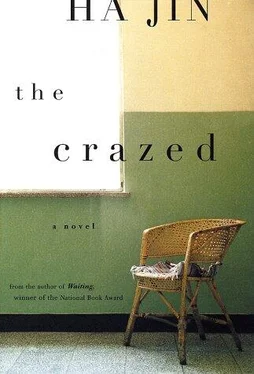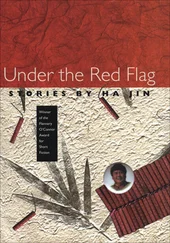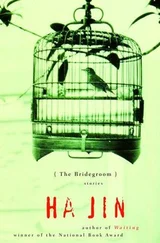I prodded him, “But you once said in class that most poems came from other poems.”
He looked askance at me, then admitted, “Yes, most poems are small potatoes that come from big potatoes, the real poems from original, genuine human experience. The big potatoes, the real poems, are planted by some people first. Then the children of the big potatoes are planted; then the grandchildren are planted. Year after year the great-grandchildren, great-great-grandchildren, great-great-great-grandchildren of the big potatoes grow smaller and smaller until they have shrunk to nothing. Then people must look for other big potatoes to grow.”
This was crazy. His analogy was wild, though refreshing. I asked without any irony, “So you think this is a big-potato poem?”
“Of course. It’s a piece in which authenticity overcomes artifice. Only after I had suffered all the miseries and abuse and the sleepless nights could I write such truthful lines. Listen, there’s not a single false sound here.” He recited again:
If only I had ten thousand mansions
To shelter all poor scholars on earth
And brighten their faces with smiles.
Look, the mansions stand like mountains
Unshakable in wind and rain!
Ah, once before my eyes arise such mansions,
I shall be happy, even though my own hut
Falls apart and I freeze to death!
“Oh, when can I see those mansions?” he cried and burst into sobs. His tears fell on the apricot-yellow cover of the book in his lap. “Where are those grand mansions?” he shouted. “Let me see them. Then I’ll die happy. Where, where are they?” He was wailing now, his mouth writhing.
I was choking with mixed emotions — pity, misery, and disgust were all welling up in my chest. He hadn’t written a single line of poetry in his whole life and had to rely on the ancient poem to express his aspiration, which was conventional and hackneyed, though not without lofty sentiment.
He blubbered again, “I only have a one-bedroom apartment. Give me one of those mansions! Where are they? I shall be a professor of the first rank, absolutely qualified for such a residence.”
What a lunatic! He made me want to laugh and weep at the same time, and my eyes misted over.
“Oh, Lord of Heaven, isn’t this a genuine poem?” he cried again. “Doesn’t it have truth in it? Truth must come true sooner or later like light that drives away darkness. But when? Why am I not allowed to see it materialize before I die? Why can’t I enter any of those high mansions to meet the happy faces of the poor scholars? If truth cannot come true, then what good can it do us? And what’s the use of a poem like this?” He pulled his right hand onto his belly, its back stained with tears. He chanted extravagantly:
Before I die, my aspiration
Is not yet realized—
Tears often wet the front
Of this hero’s robe.
He tried to reach his chest with his left hand, but couldn’t lift it that high. Suddenly with his right hand he swept the book to the floor and yelled, “I don’t want this stuff anymore! No, no more poetry, not a word of truth in it. It’s full of lies. I’ve been fooled by it all my life.”
“Professor Yang, stop, please!” I stepped over and shook his shoulder gently.
He said between gasps, “Damn it, the poem states clearly there are ten thousand mansions, but where are they? I wrote it and have studied it all my life, but I don’t even have a decent apartment. What’s the good of poetry? It just gets your hopes up.” He was trembling all over and still wouldn’t stop ranting. “People who don’t care a damn about poetry live well and wallow in bliss and comfort. One of my former classmates, who is a nincompoop specializing only in licking his superiors’ assholes, was appointed a minister in the State Council two years ago. He has so much power that he had a swimming pool constructed for himself, as easy as ordering a dish. But we, wretched scholars and fainthearted bookworms, have lain in word-hoards, feeding on paper and ink, believing in poetry, and dreaming of miracles. We are all fools! We— we—” He was panting so hard that words failed him.
I patted his back for a while to relieve his gasping. Then I began laying him down slowly. The muscles on his face twitched and twitched as though something were biting him in his mouth.
I too was sick at heart.
When Meimei and I became engaged, my parents came to Shanning to see the Yangs. They brought products from our hometown, such as hazelnuts, dried tree ears, and daylilies. They presented Meimei with a woolen coat and her parents each with a marten hat, which embarrassed me a little because the climate here wasn’t cold enough for anyone to wear such a hat. Among their gifts was a small bag of dried hedgehog mushrooms, which my townsfolk call “monkey’s heads.” These were a delicacy that could rarely be found in the forest nowadays. The Yangs were very impressed by the mushrooms, which they had heard of but never seen before. Although my mother explained to Mrs. Yang in detail how to prepare and cook them — soak them in warm water for a day, tear them into slivers, and stew them with pork or chicken— Mrs. Yang kept shaking her head and said she couldn’t make such a fancy dish by herself, afraid of spoiling the mushrooms. So my mother cooked some for the engagement dinner. The Yangs were amazed that the mushrooms tasted almost exactly like the pork shoulder they were stewed with.
At the end of the dinner, my mother took out a folded envelope and said to my fiancée, “Meimei, here’s five hundred yuan my old man and I would like to give you as a token for having you as our daughter.”
The Yangs and I were all surprised. I hadn’t anticipated that she’d follow the customs back home, which required the parents-in-law to present a sum of money to the prospective daughter-in-law, who in return must call them Father and Mother in front of everyone.
My mother remained silent, her broad face wearing an expectant smile. Meimei seemed puzzled, looking at me inquiringly. I told the Yangs, “By the customs in the Northeast, Meimei should call my parents Father and Mother when she accepts the money.”
“I’m not selling myself,” said Meimei in an undertone, but everybody heard her.
A prolonged hush fell on the table. I was disconcerted, not knowing whether I should take the money for my fiancée. Five hundred yuan was a large sum, equal to seven or eight months’ salary for a common worker. It must have taken my mother two or three years to save such an amount. My father broke in, “Well Meimei, if you’re against the old custom, we can understand. One of these days you will call us Dad and Mom anyway, so we can wait. Just take the money, okay? That will make my old wife happy.”
“I can’t do that,” said Meimei.
My mother looked upset, puffing her lips out. Luckily no other people were at the dinner, or she’d have felt she had lost face. My father told her, “Meimei is a college student, and we shouldn’t treat her like a regular bride in our small town. We should’ve thought of this beforehand.”
Then I hit upon an idea. “Mother, please keep the money for Meimei for the time being, all right? She’s wonderful with the harmonica. Can we ask her to play a tune for us instead of calling you Mom?”
To my relief, my mother agreed. “Sure, fine with me. I won’t have her do anything she doesn’t want to.”
I turned to Meimei. “Please play a piece.”
Mr. Yang chimed in, “That’s the minimum you should do for your future parents-in-law.”
Pouting, Meimei went into the bedroom and returned with her large harmonica. Without asking us what to play, she began blaring the music of “March Forward, March Forward!” the theme song of the revolutionary ballet The Red Women Detachment. The militant tune was metallic and fierce; it sounded like a pack of cats whining and growling at one another. At times one or two notes snapped out of place. The music made my temples smart. For some reason, my mother enjoyed it and even hummed along with the tune. I saw resentment in Meimei’s eyes and her red cheeks bulging. When she was done, I dared not comment, but my parents clapped their hands.
Читать дальше

![Lao Zi - Dao De Jing [Tao Te Ching] (english)](/books/3890/lao-zi-dao-de-jing-tao-te-ching-english-thumb.webp)
![Lao Zi - Dao De Jing [Tao Te Ching] (chinese)](/books/3891/lao-zi-dao-de-jing-tao-te-ching-chinese-thumb.webp)
![Lao Zi - Dao De Jing [Tao Te Ching] (espanol)](/books/3892/lao-zi-dao-de-jing-tao-te-ching-espanol-thumb.webp)







